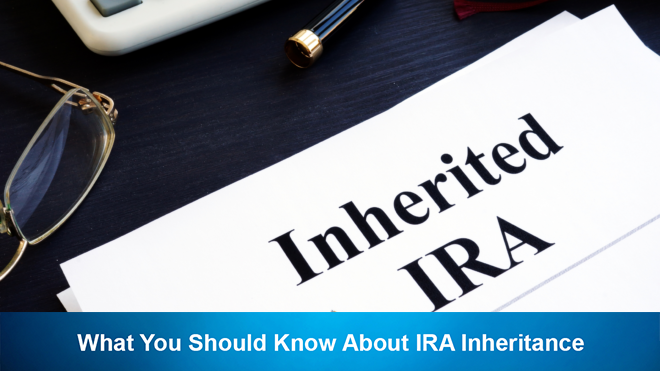The SECURE Act changed the rules for distributing assets from an inherited IRA upon the death of an IRA owner. Here’s what you need to know…
IRAs come with their own set of rules such as-minimum age for withdrawals, required minimum distributions after a certain age, taxes, and penalties to enforce them. If you’ve recently inherited an IRA, you may be wondering what to do next. Unfortunately, inherited IRA’s can be a complex issue to handle, especially if you’re in the midst of trying to close out an estate.
What is an Inherited IRA?
An inherited IRA, also known as a beneficiary IRA, is an account that is opened when an individual inherits an IRA or employer-sponsored retirement plan after the original owner dies.
A beneficiary may open an inherited IRA using the proceeds from any type of IRA, including traditional, Roth, rollover, SEP, and SIMPLE IRAs. Generally, assets held in the deceased individual’s IRA must be transferred into a new inherited IRA in the beneficiary’s name.
This transfer must be made even if a lump-sum distribution is planned. Additional contributions may not be made to an inherited IRA.
If you are the son, daughter, brother, sister, or even a close friend of an IRA owner who has named you as their beneficiary, it’s critical that you—and the owner of the IRA—understand the rules that govern IRA inheritances. Here’s how you can avoid making some costly mistakes around an inherited IRA.
How an Inherited IRA Works
Any type of IRA may be turned into an inherited IRA. When you inherit an IRA, you might have too many choices to make depending on the situation:
- If you inherited an IRA, and you’re the spouse of the original owner, you have one set of choices.
- If you’re a minor child, chronically ill or disabled, or not more than 10 years younger than the original owner, you have another set of choices.
- Whether the original account owner had to take required minimum distributions (RMDs) can also influence what you can and should do with the IRA.
These are just a few of the complex questions that an inherited IRA presents to the recipient, and recent changes to the SECURE Act 2.0 changed long-standing practices, creating more confusion.
What if I Get an IRA Not From My Spouse?
If you get an IRA from anyone other than a spouse, you cannot roll it over or put it in your own name. You will have a few options, and you have to carefully consider the costs of each one.
First off, you may take a lump sum. While it is tempting to have all of it at once, you must remember it comes with tax at ordinary income rate, pushing you up the marginal tax bracket. An IRA of $100,000 can be taxed up to 28%.
If you don’t want the lump sum, you can have it paid out to you, but this must be done within five years. And again, every withdrawal will be taxed.
Your final option is to make it an inherited IRA, like spouses can. You will have to follow a life expectancy table which tells you your RMD for each year, which will be taxed. However, because the IRA is preserved over time, it can continue to grow, giving you a longer stream of income.
Can I avoid being taxed?
Unfortunately, you can’t avoid being taxed. You can only choose the time at which you withdraw from it, but any withdrawal will be taxed. It’s important to note that there are penalties for not withdrawing on time.
Because of this, it is best to discuss your options with a financial advisor you trust. Not all options are equally as good for everyone, and you will want to consider the tax loads and penalties associated with all outcomes.
Final Thoughts
If you are a beneficiary and inherit an IRA, it’s important that you get a complete understanding of your options, and the potential outcomes of each available option for you and the inherited IRA.
Our team of experienced advisors are equipped with unique experience and guidance that will help you avoid any nasty surprises in the form of penalties or taxes. For questions about how potential tax changes affect your current strategy, contact us today to set up your complimentary strategy session!



